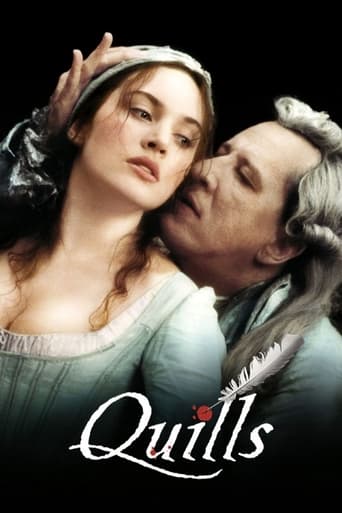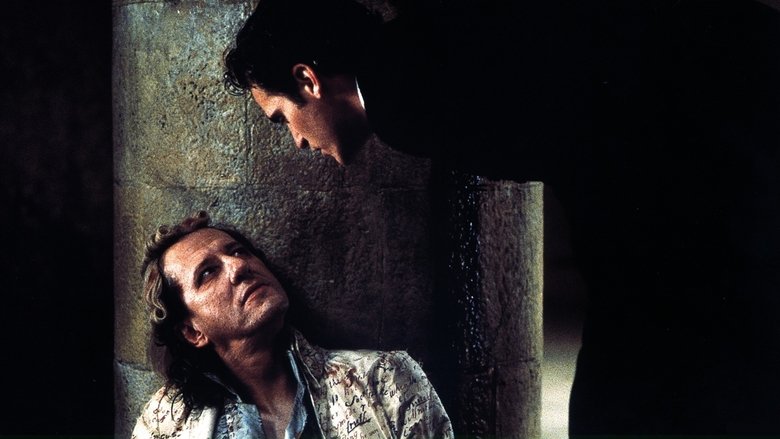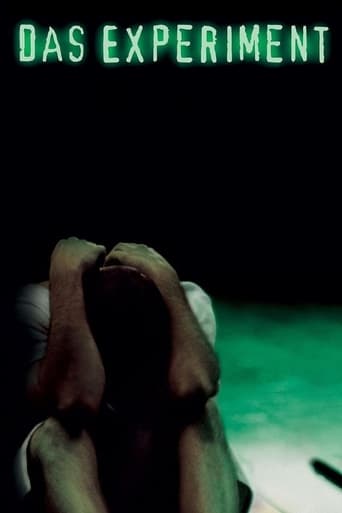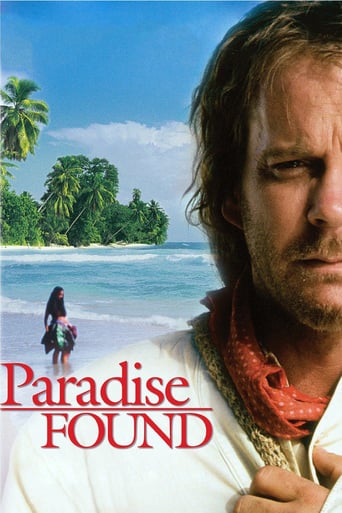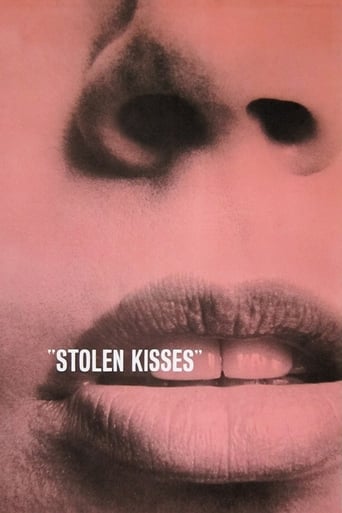Quills (2000)
A nobleman with a literary flair, the Marquis de Sade lives in a madhouse where a beautiful laundry maid smuggles his erotic stories to a printer, defying orders from the asylum's resident priest. The titillating passages whip all of France into a sexual frenzy, until a fiercely conservative doctor tries to put an end to the fun.
Watch Trailer
Free Trial Channels
Cast


Similar titles
Reviews
Very disappointed :(
This movie feels like it was made purely to piss off people who want good shows
By the time the dramatic fireworks start popping off, each one feels earned.
The plot isn't so bad, but the pace of storytelling is too slow which makes people bored. Certain moments are so obvious and unnecessary for the main plot. I would've fast-forwarded those moments if it was an online streaming. The ending looks like implying a sequel, not sure if this movie will get one
"Quills" was a difficult movie for me to watch. I don't get enjoyment out of seeing people being hurt. I don't find it entertaining to watch someone manipulate others who do harm to others or themselves. I watched it though, to see what Hollywood would make of a story of the Marquis De Sade. I should have known from the promotional ballyhoo the direction the movie would take. The film seems to celebrate the deviant behavior of a madman – as some sort of genius or repressed artist. And, it intimates that he was unjustly oppressed at the hands of evil sources. The IMDb listing has a Hollywood tag line: "In a Napoleonic era insane asylum, an inmate, the irrepressible Marquis De Sade, fights a battle of wills against a tyrannically prudish doctor." The DVD cover quoted from a New York Times review of the film that said it was "wickedly funny and very sexy." And, on Amazon.com, an editorial review refers to De Sade as "history's most infamous sexual adventurer." Nowhere in the buildup of the film is there the slightest reference to De Sade as someone with a mental disorder, with deviant behavior or who is pathological. But those are all terms that psychology has applied to such a character. It even coined a new term, based on his behavior, that describes him and others like him – sadomasochist.So, the marquis is "irrepressible?" That's a term used as much positively as negatively, as in an example from Webster's online dictionary – "a great shout of irrepressible laughter." And the doctor at the asylum is "tyrannically prudish." Neither of those words alone is used in a favorable light. Together, they are outright condemning. And, the marquis as an "adventurer," implies that he is on an exciting journey of discovery. So, the film is about a battle of the wills between good and evil. Only here it implies that sadomasochism is "good," and that other, socially acceptable behavior must be "evil." Consider these definitions that have come down to us in psychology. We get sadism from the name of the marquis. It is intentional cruelty that finds pleasure by inflicting pain, suffering or humiliation on others. It is often associated with sexual gratification from such behavior. Masochism is the enjoyment of one's own pain or humiliation. Sadomasochism is both. This film clearly portrays all of this, especially in the character of the marquis. My three stars are for Geoffrey Rush and his performance as the marquis. He indeed seems to be a person who relishes and revels in the deviant, and enjoys the hurt to himself and others. He has a little shock at the end to find that his promiscuity and goading of other asylum inmates leads to the killing of a girl. From what is known about sadomasochism though, his shock is not to be believed. He would probably have laughed about it as well, or shrugged it off. The film is admittedly a big piece of fiction. We're to believe that so many others – the workers in the asylum, and the general public were spellbound by De Sade's lascivious behavior and writing. Well, all except the pompous clergy and prudes of civil authority. De Sade's time was during the French Revolution, when madness ruled for many years and society lost its bearing. Civilization regressed for a time in France. I don't see a study of sexuality here, that one reviewer saw. Nor do I see De Sade as a creative genius, as a few see him. The Marquis De Sade was of noble birth and a French aristocrat. He was highly educated, and a philosopher of sorts. He was a revolutionary politician. He was a writer who was known for his promiscuity and deviant behavior, which he put down on paper. He also was a madman.This film came out in 2000, and the start of a new century and millennium. If this film, indicated by the praise for it in some quarters, is a sign of the changing times, will we soon see a reversal of mores? Will rape, murder, pornography, sexual abuse, personal assault and pathological behavior become the norm and no longer be abhorred? Will we soon see the loss of all morality, with tyranny replacing civilization? Praise of such films as this tells me that civilization may have begun to regress. But then, this may reflect just a small portion of society. Society is made up of many minorities. But, it can also come to be ruled by a minority that is destructive. We should remember that from Nazi Germany. Let's hope that most of society won't want to shuck its mores for unbridled freedom that leads to tyranny. This was not an entertaining film for me. Of all my family and friends, I can't think of one who would enjoy this movie. The only reason I could see for watching it would be to get a glimpse of sadomasochism, from its namesake. And, or to see how Hollywood yet in the 21st century will glamorize, gloss over or greatly fictionalize a subject.
Certainly not the period piece one would think of when talking about, well, period pieces. It's very amazingly built. it has such a dark, ominous atmosphere that really sets it apart, that same atmosphere really building to what the film is trying to say and to the film's climax. The performances from the entire cast are exquisite. Kate Winslet shines in one of her lesser known roles, and it's so great to see Joaquin Phoenix, who even threatens and succeeds to steal the film away from his co-stars. What an immensely talented actor. Then, we have Geoffrey Rush who brings a lot of different shades and dynamics to his character in a way I'm not sure any just other could've done.
I mainly give this movie a high rating because not only does it tackle a topic dear to my heart and mind, but also it does so very artfully and dexterously. Having the historically notorious character of the Marquis de Sade as the central figure of the story was more than enough to draw my attention. I doubt that the events in the movie are historically 100% accurate but I liked how Doug Wright subdued a quite few facts about de Sade and the era in order create a provoking drama about the power of the word. The movie examines some long accepted paradigms, gets deep into them and turns their components upside down. Religion is no longer the epitome of virtue and innocence and uncensored creativity is not necessarily mischievous. Good and evil, virtue and vice are not easily defined or distinguished; they interplay and exchange places all the time, and to understand one, we must understand the other.This switching of rules and blurring of boundaries will leave you with some serious questions about the nature of art and its effect on the human mind; is it liberating or sin-provoking? Does it build identities or corrupt souls? Should it be censored or not? And, in the first place, what exactly should be called 'art'? Whatever side you're on, the movie will upset your former convictions and stir countless questions in your head.The story is beautifully and grippingly developed. However, the exquisite performance of Rush, Winslet, Caine and Phoenix is what gave shape and soul to the film. Geofrrey Rush's depiction of the Marquis de Sade is hauntingly unforgettable. Kate Winslet dealt with her role as the innocent, yet playful, chambermaid Madeline with professional ease and confidence. The whole cast seemed to be in great harmony actually.The movie is not about obscene and erotic literature per se. It just gives an extreme example, that could pretty much be applied to anything, of how far the artistic expression could go, and also what suppression of creativity could lead us to.
Luckily for the Marquis, at first anyway, is that there is something of an understanding priest in the Abbe du Coulmier, another wonderful performance from Joaquin Phoenix. An intensely religious man, Coulmier believes that the Marquis should be allowed to write, if only to purge himself of the sadism with which his head is filled and which would later be named after him.Kate Winslet plays Madeleine, a laundry maid who smuggles the Marquis' writing out of the asylum so that it can be published, for which many people are not happy, but many others are. The Marquis dips into the extensive world of the forbidden sexual taboos of the 18th and 19th centuries, writing extensively about them without a care in the world for propriety. One may wonder to what extent the Marquis' writings were such a hit because they were forbidden, or because of their lewd content, which may euphemistically be described as guilty pleasures for the masses. Indeed, Larry Flynt was not working, so graphic pornography was something of a rarity.There is a curious relationship between the Marquis and a physician named Royer-Collard, played by Michael Caine, who is assigned to law down the law with the Marquis and prevent him from writing anymore. The glee with which the Marquis mocks and taunts him are some of the best parts of this outstanding film. There is a great parallel between the two characters, as well. Royer-Collard pretends to be a moral role model, at the same time taking a wife who is young enough to be his daughter, possibly even his granddaughter, and treats the Marquis with exactly the same sadistic (if I can again use the term for the behavior for which the Marquis would later be named) behavior that he condemns that Marquis for writing about. Both men engage in many of the same practices, it's just that the Marquis makes no attempt and has no interest in hiding his interests in the pleasures of the flesh.

